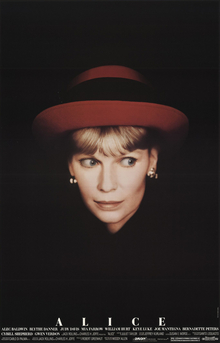
Alice is a 1990 American fantasy romantic comedy film written and directed by Woody Allen and starring Mia Farrow, Joe Mantegna, and William Hurt. The film is a loose reworking of Federico Fellini's 1965 film Juliet of the Spirits.

William Lawrence Boyd was an American film actor who is known for portraying the cowboy hero Hopalong Cassidy.
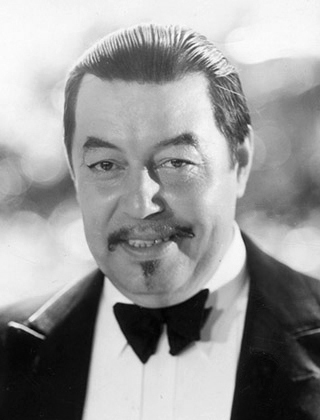
Warner Oland was a Swedish-American actor. His career included time on Broadway and numerous film appearances. He is most remembered for playing several Chinese and Chinese-American characters: Dr. Fu Manchu, Henry Chang in Shanghai Express, and, most notably, Honolulu Police detective Lieutenant Charlie Chan in 16 films.

Frankie and Johnny is a 1966 American Western musical film starring Elvis Presley as a riverboat gambler. The role of "Frankie" was played by Donna Douglas from The Beverly Hillbillies TV series. The film reached #40 on the Variety weekly national box office list for 1966. The budget of the film was estimated at $4.5 million. The director was Frederick De Cordova, who in 1970 went on to become the director and producer of The Tonight Show Starring Johnny Carson.
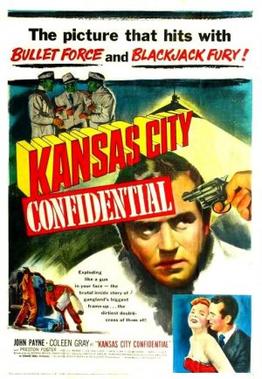
Kansas City Confidential is a 1952 American film noir and crime film directed by Phil Karlson starring John Payne and Coleen Gray. The film was released in the United Kingdom as The Secret Four. Karlson and Payne teamed a year later for 99 River Street, another film noir, followed by Hell's Island, a film noir in color.

The Jury is a British television serial broadcast in 2002. The series was the first ever to be allowed to film inside the historic Old Bailey courthouse.

Manhandled is a 1949 American film noir crime film directed by Lewis R. Foster and starring Dorothy Lamour, Sterling Hayden and Dan Duryea. It is based on the 1945 novel The Man Who Stole a Dream by L. S. Goldsmith.
"In Camelot" is the 59th episode of the HBO original series The Sopranos and the seventh of the show's fifth season. Written by Terence Winter and directed by Steve Buscemi, it originally aired on April 18, 2004.

Mr. Lucky is a 1943 romance film directed by H.C. Potter, starring Cary Grant and Laraine Day. It recounts the tale of an attraction between a shady gambler and a wealthy socialite in the days prior to the United States entering World War II.
Manpower is a 1941 American crime melodrama directed by Raoul Walsh and starring Edward G. Robinson, Marlene Dietrich, and George Raft. The picture was written by Richard Macaulay and Jerry Wald, and the supporting cast features Alan Hale, Frank McHugh, Eve Arden, Barton MacLane, Ward Bond and Walter Catlett.

Susan's Plan is a 1998 American black comedy film written and directed by John Landis and starring Nastassja Kinski, Dan Aykroyd, Billy Zane, Rob Schneider, Lara Flynn Boyle and Michael Biehn. The plot revolves around Susan (Kinski)'s plan to kill her former husband and collect his life insurance.

Now I'll Tell is a 1934 American Pre-Code drama film directed by Edwin J. Burke starring Spencer Tracy, Helen Twelvetrees, and Alice Faye. It was produced by Fox Film shortly before the company's merger with Twentieth Century Pictures. It marked the final screen appearance of former silent star Alice Calhoun.
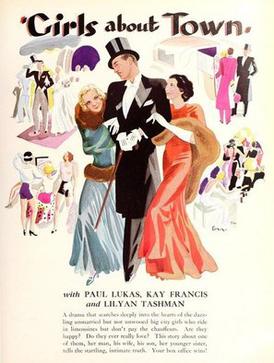
Girls About Town is a 1931 American pre-Code romantic comedy film directed by George Cukor and starring Kay Francis and Joel McCrea.
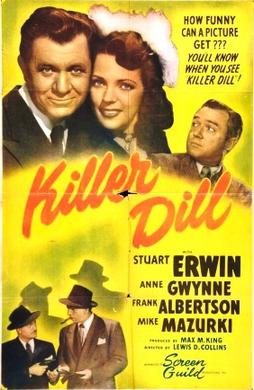
Killer Dill is a 1947 American comedy film directed by Lewis D. Collins and starring Stuart Erwin, Anne Gwynne and Frank Albertson. It set in 1931 during the Prohibition Era.
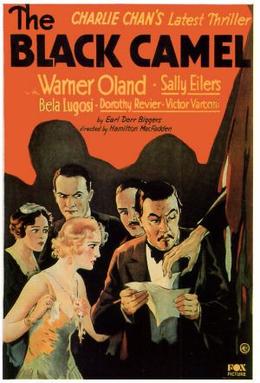
The Black Camel is a 1931 American pre-Code mystery film directed by Hamilton MacFadden and starring Warner Oland, Sally Eilers, Bela Lugosi, and Dorothy Revier. It is based on the 1929 novel of the same name by Earl Derr Biggers. It is the second film to star Oland as detective Charlie Chan, and the sole surviving title of the first five Chan films starring Oland. The Black Camel marked the film debut of Robert Young.

Wild Harvest is a 1947 American drama film directed by Tay Garnett and starring Alan Ladd, Dorothy Lamour and Robert Preston. It was produced and distributed by Paramount Pictures.

Carolina Moon is a 1940 American Western film directed by Frank McDonald and starring Gene Autry, Smiley Burnette, and June Storey. Based on a story by Connie Lee, the film is about a singing cowboy who comes to the aid of plantation owners who are being robbed of their land by a scheming lumber company.

The Red Dice is a 1926 American silent crime drama film directed by William K. Howard and produced by Cecil B. DeMille. It stars Rod La Rocque and Marguerite De La Motte and was released through Producers Distributing Corporation. Art direction for the film was done by Max Parker. The film was adapted by Jeanie MacPherson and Douglas Z. Doty from the 1925 Octavus Roy Cohen novel The Iron Chalice. The novel was adapted again in 1931 as The Big Gamble.

The Count of Ten is a 1928 American silent sports drama film directed by James Flood and starring Charles Ray, James Gleason, and Jobyna Ralston.
Amos is a 1985 American made-for-television drama film directed by Michael Tuchner and written by Richard Kramer. It is based on the 1983 novel Amos: To Ride a Dead Horse by Stanley Gordon West. The film stars Kirk Douglas, Elizabeth Montgomery, Dorothy McGuire, Pat Morita, James Sloyan and Ray Walston. The film premiered on CBS on September 29, 1985.


















